- Home
- Stephanie Laurens
The Confounding Case Of The Carisbrook Emeralds Page 13
The Confounding Case Of The Carisbrook Emeralds Read online
Page 13
“It’s not like Penelope to be late.” Stokes’s gaze was fixed on the northern end of the street.
“No.” His hands sunk in his pockets, Barnaby leaned against the railings bordering the pavement. “There’ll be some reason, but all in all, I suspect we’ll do better to wait and have her with us when we go in.”
Stokes grunted in reluctant agreement.
Barnaby mulled over what Stokes had reported of his interview with Bridge. “Did Montague give you any idea of when we might hear back from Roscoe? Who best to ask about stolen emeralds shouldn’t be hard for Roscoe to define.”
“Let’s hope for a quick reply.” Stokes shifted. “If the Carisbrook emeralds aren’t fakes and have fallen into some high-class fence’s hands, we’re unlikely to see them again.”
“Not as that ugly necklace, anyway.” Barnaby looked northward, too. “It’ll be broken up, the stones removed, and the gold melted down faster than you can blink.” A carriage turned in to the street. He recognized the coachman and straightened from the railings. “Here she is.”
The carriage pulled up at the curb beside them. Barnaby waved the groom back and opened the door—and Penelope literally fell into his arms.
“Oh!” She blinked at him, smiled, then immediately her expression turned contrite. She looked past Barnaby’s shoulder at Stokes. “I’m sorry I’m late—I couldn’t get away from my sisters. Portia literally held onto my sleeve—they wanted me to agree to a new roster… Well, it took simply ages to go through it.”
Barnaby grinned and set his wife on her feet. She didn’t often get flustered, but as she huffed and straightened her gown and the small hat perched on her coiled hair, to him, she looked adorable. “We decided to wait for you before going in.”
The look she cast him made it clear she hadn’t imagined they wouldn’t. Then she swung and faced the Carisbrooks’ door. “Well, then—let’s get to it.”
She allowed Stokes to lead the way. Barnaby brought up the rear as they climbed the front steps, were admitted by Jarvis, and filed into the front hall.
After verifying that her ladyship was—as they’d hoped—out for the afternoon, Stokes requested an audience with Lord Carisbrook, and they were shown into the study.
His lordship rose to welcome them. After exchanging greetings, he fixed his gaze on Stokes. “Any news?”
“Sadly, no, but it’s early days yet.” Stokes saw no reason to mention his visit to Rundell, Bridge, and Company. “We’re here”—he included Barnaby and Penelope with a glance—“to, with your permission, question the staff again. There are several minor matters we need to clear up.”
“Of course, of course.” His lordship waved expansively. “Ask whatever you wish. I’m sure all our staff will be happy to oblige.” He looked toward the door where Jarvis had lingered. “Jarvis, please assist Inspector Stokes and Mr. and Mrs. Adair in whatever way they require.”
“Yes, my lord.”
With polite nods, Stokes, Barnaby, and Penelope turned to leave.
Lord Carisbrook reached out a hand to Penelope. “Mrs. Adair, I wonder… Cara—how is she?”
Penelope smiled reassuringly. “She’s in good spirits. I believe Mr. Hugo Adair has arranged for Cara to meet with his sisters—Lady Guilfoyle and Lady Monk.” She glanced at the clock on his lordship’s desk. “Cara and he should be heading to Green Street shortly.”
His lordship blinked, clearly taken aback. “Oh, good.” Then his expression brightened, and he smiled. “Very good.” He inclined his head to Penelope. “Thank you, Mrs. Adair. Cara is clearly in good hands.”
With a final nod to his lordship, Stokes led the way out. He paused in the front hall and arched a brow at Barnaby and Penelope, but when they merely stared back at him, he turned to Jarvis, who had followed them from the room and stood waiting, as instructed, to render all assistance. “We need to speak with all the members of the staff, this time one by one, in private.”
Jarvis thought, then offered, “Mrs. Jarvis’s room would be best for your purpose. Who do you wish to speak with first?”
Stokes glanced at Penelope. This time, she responded. “Her ladyship’s dresser.”
Jarvis inclined his head. “If you will come this way?”
He preceded them through the green-baize-covered door at the end of the hall, into the short corridor that led to the servants’ hall. A few paces along the corridor, Jarvis opened a door to the left and ushered them into a small square room, modestly but comfortably furnished with a dresser, two armchairs angled before a small fireplace, and most pertinently, a simple desk with a mismatched selection of straight-backed chairs.
“Will this do?” he asked.
“Admirably.” Penelope set her reticule on the dresser, then turned to survey the desk and chairs.
Stokes looked at Jarvis. “Simpkins?”
“I’ll send her along immediately.” Jarvis bowed and withdrew.
Penelope directed Barnaby and Stokes in arranging the three most comfortable chairs behind the desk. She selected a simple wooden one with no cushion and placed it facing the desk. “There. Our stage is set.”
She bustled around to claim the chair at one end of the row of three. Stokes sat in the central chair, with Barnaby on his other side.
They’d barely settled when a tap fell on the door.
At Stokes’s “Come in,” Simpkins appeared. She shot them a wary, measuring glance, then closed the door and, at Stokes’s wave, approached the desk.
Penelope nodded at the single chair. “Sit, please.”
Like most staff, Simpkins wasn’t comfortable sitting in the presence of her betters; she sank rather carefully onto the seat, arranging her skirts tightly about her legs, then clasping her hands in her lap.
Stokes had laid his open notebook on the table before him; he kept his gaze on it. “We need to verify exactly who was in this house in the early hours of Sunday morning, between the time Lady Carisbrook returned and the time she realized the emeralds were missing.”
“I’ve already told you all I know.” Simpkins’s tone was decidedly snippy.
Barnaby arched his brows. “Is that so?” His tone suggested he wasn’t impressed by Simpkins’s attitude. “Because we should point out that, as matters currently stand, you are one of only two staff members who could have taken the emeralds.”
Simpkins bristled. “I didn’t take them. What would I want with such things?”
“We really don’t know,” Penelope countered, “which is why we would like you to think very carefully about whether anyone else could have entered her ladyship’s room between the time you left and the time the tweeny—Missy—went in to lay the fire in the morning.”
Simpkins frowned. “But Miss Di Abaccio—”
“Went in later,” Stokes cut in. “Yes, we know. But at this point, we want to confirm that no one else—no one else at all—had access to that room and the emeralds.”
They had no evidence that there had been anyone else, just the odd behavior of the staff and the unlikelihood that any of the four people currently on their list—Lady Carisbrook, Simpkins, Missy, and Cara—was the thief. But they’d often found, especially when dealing with a diverse group such as the staff of a house, that simply pressing hard on one possible point would cause someone to stumble and reveal where the real clue lay.
Simpkins all but glowered and repeated, “I’ve told you all I know.”
All three of them pressed her in various ways, but the most clarification they got from her was “No one else came into the room while I was with her ladyship, and when I left, I didn’t see anyone else on that floor or on the stairs or anywhere about.”
Finally, Stokes dismissed her. After jotting down various points in his notebook, he saw that Penelope’s head was tipped, her gaze fixed on the door through which Simpkins had gone. “What did you think?” he asked.
Penelope frowned. “I think she’s telling the truth about not seeing or knowing of anyone else being there, but I got
the distinct impression she’s worried that there might have been someone—someone we don’t yet know about—who went to her ladyship’s room during the critical hours.”
Barnaby nodded. “I agree—Simpkins doesn’t know, but she suspects.”
“Right, then.” Stokes consulted the list of the staff Morgan had made for him. “Let’s leave the Jarvises for now and go on down the list.”
They spoke next with the senior footman, Jeremy. He pointed out that he hadn’t been summoned to that part of the house at any time during the evening in question. The same was true for the parlor maid, Helen, and the upstairs maid, Abby. Henderson, his lordship’s valet—a quietly spoken, very neat individual—was vague and could tell them nothing; as he explained, with his lordship away, there was no reason for him to be on that floor.
Julia’s maid, Polly, had been waiting in Julia’s room when her mistress, along with Lady Carisbrook and Franklin, had returned to the house. “Miss Julia’s chamber is on the same floor,” Polly admitted, “but it’s right away at the end of the wing. At night, you can barely see her ladyship’s door from Miss Julia’s.”
While they questioned her, pressing her to remember anything she’d seen or heard, especially on quitting Julia’s room and descending to the servants’ hall, Polly shifted and squirmed, but ultimately, told them nothing.
Penelope stared at the door after Polly had left. “Again,” Penelope said, “she isn’t lying and truly doesn’t have anything factual to tell us. But there is something—something they’re all hiding!”
Barnaby’s expression had hardened. “We’re not asking the right question.”
“Would that we knew what the right question was.” Stokes considered his own impressions. “The staff are staunchly loyal, and I get the feeling that’s to the family as a whole. They don’t want to lie—not even Simpkins—but they’re going to do their damnedest to avoid telling us anything they think might damage the family.”
Penelope nodded. “Lord Carisbrook and the children, certainly, and because anything regarding her ladyship will, by association, reflect on his lordship, she’s protected, too.”
Stokes inclined his head. After a moment, he went on, “It’s perfectly possible that whatever they’re hiding has nothing to do with the emeralds, but…”
“They might be wrong.” Barnaby glanced at Stokes. “We still need to know.”
Stifling a sigh, Stokes consulted his list. “Next up is the under footman, Henry.”
Henry proved to be an earnest lad hoping to work his way up to butler. “Eventually, obviously.” He blushed, pressing his hands, palms together, between his knees.
“So,” Stokes said, pretending to read from his notebook, “between the hours of two o’clock and eight-thirty on Sunday morning, did you see anyone on the first floor, either near or going into or coming out of her ladyship’s room?”
“No.” Henry’s reply was confident and clear. “I didn’t see anyone.”
Penelope frowned. “But you were on the first floor during those hours?”
Suddenly, Henry looked conscious. He had the sort of countenance best described as open; no matter how hard he tried, he couldn’t hide his emotions. “Ah…well…yes.” The last word came out on a squeak. He stared at Penelope as if she’d transformed into a dangerous being.
“What took you to the first floor?” Barnaby drew Henry’s startled attention.
“Ah…” Henry’s features blanked, then, hesitantly, he offered, “Lady Carisbrook rang…and I went up.”
“Just to be clear”—Stokes used his calmest, most matter-of-fact tone—“this was after she returned home and went up to her room?”
Henry gulped and nodded. “Jeremy had already gone to bed, so I went up.”
“And what,” Penelope asked, “did her ladyship want?”
“She…ah…asked me to deliver a message, ma’am.”
“To whom?” Penelope inquired.
Henry stared, then shifted his gaze to Stokes, as if seeking rescue, but all he met was Stokes’s steady and utterly implacable gaze. Henry swallowed again and squeaked, “It was for Mr. Franklin.”
“And did you deliver the message?” Barnaby asked.
Henry’s head bobbed. “Yes, sir.”
“What was the message?” Stokes brought Henry’s gaze back to him.
Henry met Stokes’s eyes, then rubbed his palms along his thighs. “Her ladyship wanted to speak to Mr. Franklin. Straightaway.”
“And did Mr. Franklin go to her ladyship?” Stokes’s voice had turned stern.
His eyes wide, Henry shook his head vehemently. “It’s like I said—I didn’t see anyone near or going into or coming out of her ladyship’s room. I swear I didn’t.”
“So what happened when you gave Franklin the message?” Penelope leaned forward, her attitude one of all reasonableness. “What did he do?”
“He thanked me and waved me off,” Henry said. “I left and went downstairs, and I didn’t see anybody on the way.”
Penelope stilled for a second, then leaned over to look at Stokes’s list of the staff. “Does Mr. Franklin have a gentleman’s gentleman?”
“No, miss.” Henry had sucked in a breath and was calming. “His lordship’s valet, Henderson, does for Mr. Franklin as needed.”
“I see.” Penelope exchanged a brief glance with Barnaby. That was another indication that the Carisbrooks might not be as well-to-do as they appeared.
Stokes considered his notes. “So you, too, entered Lady Carisbrook’s room that night. While you were there, did you see the jewel case on her dressing table?”
Henry frowned, clearly thinking back, then shook his head. “I can’t say that I noticed, sir. I just looked straight ahead like we’re told to.”
Stokes faintly grimaced. He paused, then asked, “Is there anything you haven’t told us of what you saw or did while on the first floor of this house during those hours?”
Henry swallowed, but his gaze had steadied. “No, sir.”
Stokes inclined his head. “You may go.”
Henry escaped.
Once the door had shut behind him, Stokes glanced at Penelope, then at Barnaby. “It sounds as if we’ll have more questions for Franklin, and for her ladyship as well.”
“Hmm.” Penelope frowned. “But later.” She waved to the door. “Let’s continue on with the staff. There’s something niggling at the back of my brain—it’ll surface eventually, but for now, let’s make sure there’s nothing else the staff have carefully omitted to mention.”
Stokes rang a small handbell and, when Jarvis stuck his head around the door, asked to see the cook next. Mrs. Smollet had nothing at all to tell them—apparently she and the scullery maid, Peggy, were tucked up in their beds the whole time. “We get to bed early because we’re the first up.”
Peggy confirmed that, as did Missy, the tweeny.
They were all exceedingly gentle with Missy, who appeared terrified that she’d be browbeaten into saying more than “I don’t know anything, miss. I didn’t see anyone about. It was only me, creeping about, laying and lighting the fires.”
As Missy rose to leave, Penelope looked up. “Please send Polly in again.”
Missy blinked, but bobbed and slipped through the door.
Stokes angled a questioning look at Penelope.
She smiled tightly. “I just remembered a question we forgot to ask.”
Once Polly—now even more nervous over having been summoned a second time—had subsided onto the hard chair, Penelope smiled reassuringly and asked, “Before, we spoke of when you were on the first floor around the time Miss Julia and her ladyship returned to the house.” Penelope smoothly continued, “Let’s talk, now, of when you went up to Miss Julia’s room in the morning. What time was that?”
Polly’s eyes went wide. She whispered, “I always go up at seven-thirty, ma’am.”
Penelope nodded. “Did you see anyone else in the corridor or on that floor on your way up and back?”
&
nbsp; “No, ma’am.” Polly’s hands were in her lap, her fingers gripping tight.
“While you were in her room, did Miss Julia leave the room at any time?” Stokes asked.
Polly hesitated, then her chin firmed. “No, sir.”
Penelope narrowed her eyes on the maid. “Polly…”
Polly caught her breath and looked as if she might cry. After a second’s fraught silence, she blurted, “I don’t know where she was—she wasn’t in her room when I got there, but I can’t say she was in her ladyship’s room. I don’t know!”
The last was a wail, but when Penelope simply blinked and sat back, Polly gulped in a breath and, gradually, quieted.
After a moment, Penelope nodded. “All right. So you went up to Miss Julia’s room at seven-thirty. You saw no one else wandering about along the way. But when you entered Miss Julia’s room, she wasn’t there.” Penelope paused, then asked, “I presume you waited until she returned?”
Polly nodded. “Yes, ma’am. She came in…must have been about five or so minutes later.”
“Was she carrying anything?” Barnaby asked.
Polly blinked and shook her head, plainly not registering the implication. “No. She just came in, sighed, and plopped down on her dressing stool, and I started doing her hair.”
“Did she often go to see her mother at that time of the morning?” Penelope asked.
Polly waggled her head. “I wouldn’t say often, but sometimes, when Miss Julia wanted to know something about where they were going that day or what her ladyship wanted her to wear, Miss Julia would go in around then. Her ladyship likes to wake about then and lie in before her breakfast tray arrives at eight.” Polly shifted, looking supremely uncomfortable. “But I can’t say as where Miss Julia actually was that morning. I didn’t ask, and she didn’t say.”
“No matter.” Penelope smiled. “We’ll ask, and then we’ll know.”
After a glance at Stokes, she dismissed Polly.
The instant the door closed behind the maid, Stokes, scribbling in his notebook, said, “Now we’re getting somewhere.” He glanced at Penelope. “That was a good catch.”
Penelope tipped her head at Barnaby. “It was one of those questions we hadn’t asked.”

 Lady Osbaldestone’s Plum Puddings: Lady Osbaldestone’s Christmas Chronicles Volume 3
Lady Osbaldestone’s Plum Puddings: Lady Osbaldestone’s Christmas Chronicles Volume 3 The Beguilement of Lady Eustacia Cavanagh: The Cavanaughs Volume 3
The Beguilement of Lady Eustacia Cavanagh: The Cavanaughs Volume 3 Loving Rose: The Redemption of Malcolm Sinclair (Casebook of Barnaby Adair)
Loving Rose: The Redemption of Malcolm Sinclair (Casebook of Barnaby Adair) By Winter's Light
By Winter's Light Devil's Bride
Devil's Bride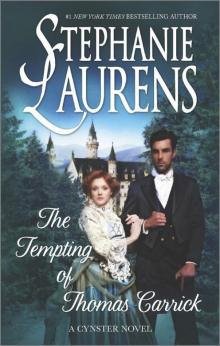 The Tempting of Thomas Carrick
The Tempting of Thomas Carrick![Cynster [22.00] A Match for Marcus Cynster Read online](http://i1.bookreadfree.com/i/03/16/cynster_[22_00]_a_match_for_marcus_cynster_preview.jpg) Cynster [22.00] A Match for Marcus Cynster
Cynster [22.00] A Match for Marcus Cynster All About Love c-6
All About Love c-6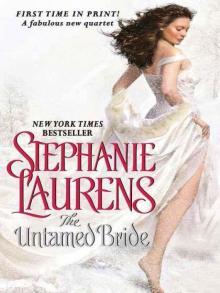 Cobra 01 The Untamed Bride
Cobra 01 The Untamed Bride A Lady of Expectations and Other Stories
A Lady of Expectations and Other Stories By Winter's Light_A Cynster Novel
By Winter's Light_A Cynster Novel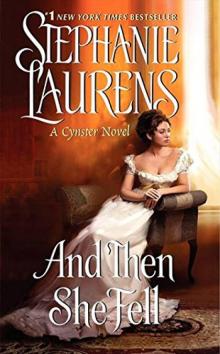 And Then She Fell
And Then She Fell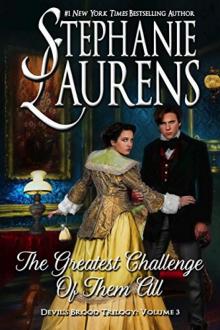 The Greatest Challenge of Them All
The Greatest Challenge of Them All The Edge of Desire
The Edge of Desire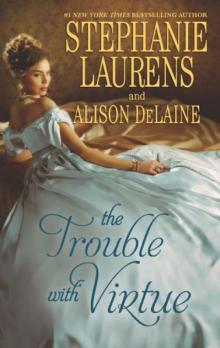 The Trouble With Virtue: A Comfortable WifeA Lady by Day
The Trouble With Virtue: A Comfortable WifeA Lady by Day Fair Juno
Fair Juno THE LEGEND OF NIMWAY HALL: 1750 - JACQUELINE
THE LEGEND OF NIMWAY HALL: 1750 - JACQUELINE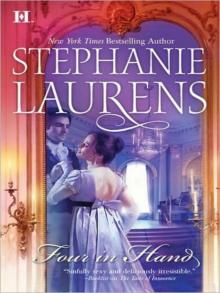 Four In Hand
Four In Hand The Reckless Bride
The Reckless Bride Stephanie Laurens Rogues' Reform Bundle
Stephanie Laurens Rogues' Reform Bundle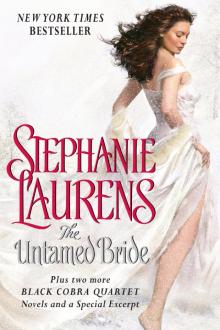 The Untamed Bride Plus Black Cobra 02-03 and Special Excerpt
The Untamed Bride Plus Black Cobra 02-03 and Special Excerpt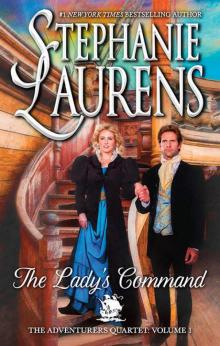 The Lady's Command (Adventurers Quartet #1)
The Lady's Command (Adventurers Quartet #1) The Seduction of Sebastian Trantor
The Seduction of Sebastian Trantor The Daredevil Snared (The Adventurers Quartet Book 3)
The Daredevil Snared (The Adventurers Quartet Book 3)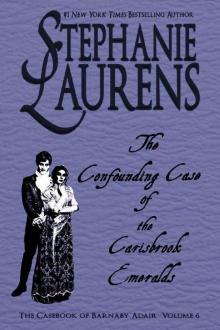 The Confounding Case Of The Carisbrook Emeralds (The Casebook of Barnaby Adair 6)
The Confounding Case Of The Carisbrook Emeralds (The Casebook of Barnaby Adair 6) Lord of the Privateers (The Adventurers Quartet)
Lord of the Privateers (The Adventurers Quartet)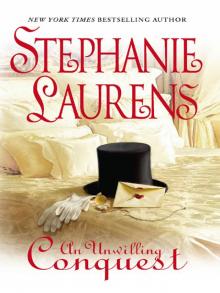 An Unwilling Conquest
An Unwilling Conquest Brazen Bride
Brazen Bride On a Wild Night
On a Wild Night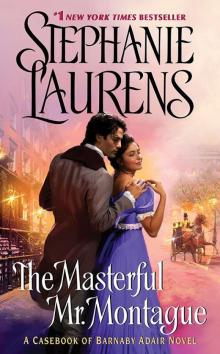 The Masterful Mr. Montague: A Casebook of Barnaby Adair Novel
The Masterful Mr. Montague: A Casebook of Barnaby Adair Novel Lord of the Privateers
Lord of the Privateers Royal Bridesmaids
Royal Bridesmaids Beyond Seduction
Beyond Seduction It Happened One Night
It Happened One Night The Ideal Bride
The Ideal Bride The Promise in a Kiss
The Promise in a Kiss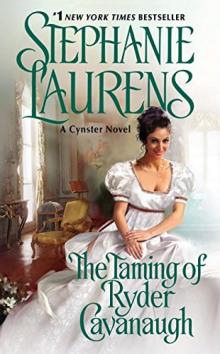 The Taming of Ryder Cavanaugh
The Taming of Ryder Cavanaugh The Ideal Bride c-12
The Ideal Bride c-12 All About Love
All About Love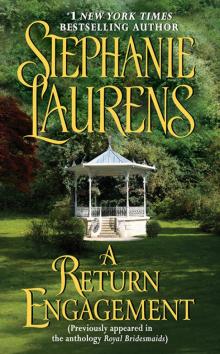 A Return Engagement
A Return Engagement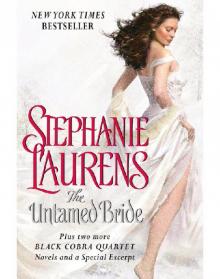 The Untamed Bride Plus Two Full Novels and Bonus Material
The Untamed Bride Plus Two Full Novels and Bonus Material Viscount Breckenridge to the Rescue
Viscount Breckenridge to the Rescue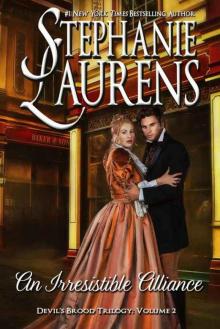 An Irresistible Alliance (Cynsters Next Generation Novels Book 5)
An Irresistible Alliance (Cynsters Next Generation Novels Book 5) The Daredevil Snared
The Daredevil Snared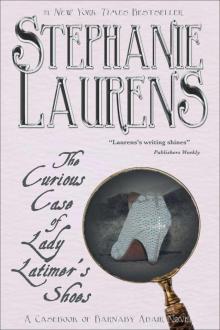 The Curious Case of Lady Latimer's Shoes: A Casebook of Barnaby Adair Novel
The Curious Case of Lady Latimer's Shoes: A Casebook of Barnaby Adair Novel A Lady of Expectations and Other Stories: A Lady of ExpectationsThe Secrets of a CourtesanHow to Woo a Spinster
A Lady of Expectations and Other Stories: A Lady of ExpectationsThe Secrets of a CourtesanHow to Woo a Spinster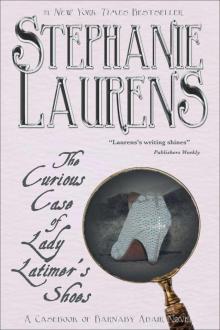 The Curious Case of Lady Latimer's Shoes: A Casebook of Barnaby Adair Novel (The Casebook of Barnaby Adair)
The Curious Case of Lady Latimer's Shoes: A Casebook of Barnaby Adair Novel (The Casebook of Barnaby Adair)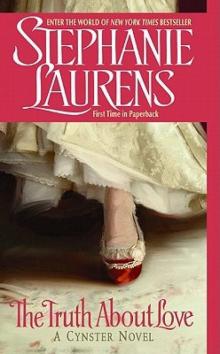 The Truth About Love
The Truth About Love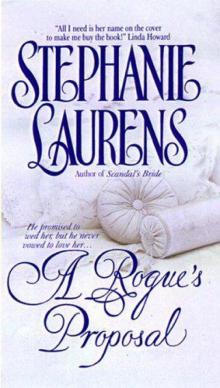 A Rogue's Proposal
A Rogue's Proposal The Elusive Bride
The Elusive Bride The Perfect Lover
The Perfect Lover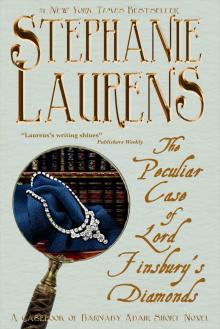 The Peculiar Case of Lord Finsbury's Diamonds: A Casebook of Barnaby Adair Short Novel
The Peculiar Case of Lord Finsbury's Diamonds: A Casebook of Barnaby Adair Short Novel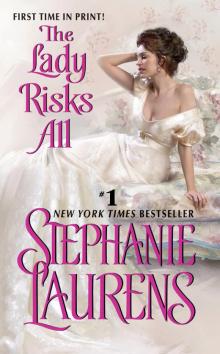 The Lady Risks All
The Lady Risks All The Murder at Mandeville Hall: The Casebook of Barnaby Adair: Volume 7
The Murder at Mandeville Hall: The Casebook of Barnaby Adair: Volume 7 All About Passion
All About Passion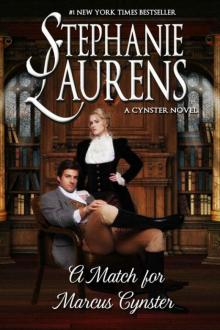 A Match for Marcus Cynster
A Match for Marcus Cynster By Winter's Light: A Cynster Novel (Cynster Special Book 2)
By Winter's Light: A Cynster Novel (Cynster Special Book 2) The Lady By His Side
The Lady By His Side The Pursuits of Lord Kit Cavanaugh
The Pursuits of Lord Kit Cavanaugh Tangled Reins
Tangled Reins To Distraction
To Distraction A Rake's Vow
A Rake's Vow A Comfortable Wife
A Comfortable Wife A Lady of His Own bc-3
A Lady of His Own bc-3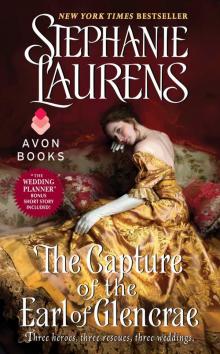 The Capture of the Earl of Glencrae
The Capture of the Earl of Glencrae Scandals Bride c-3
Scandals Bride c-3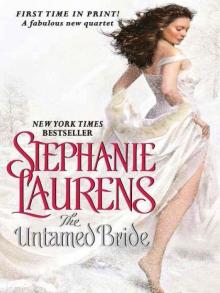 Untamed Bride
Untamed Bride The Brazen Bride
The Brazen Bride The Lady By His Side (Cynsters Next Generation Novels Book 4)
The Lady By His Side (Cynsters Next Generation Novels Book 4)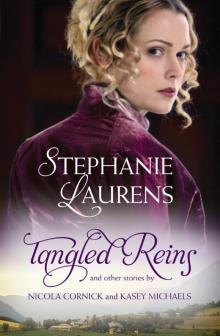 Tangled Reins and Other Stories
Tangled Reins and Other Stories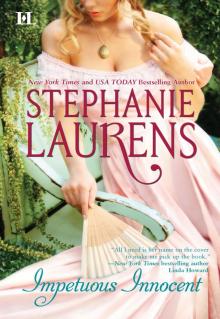 Impetuous Innocent
Impetuous Innocent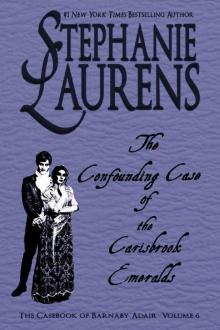 The Confounding Case Of The Carisbrook Emeralds
The Confounding Case Of The Carisbrook Emeralds Stephanie Laurens - B 6 Beyond Seduction
Stephanie Laurens - B 6 Beyond Seduction What Price Love?
What Price Love? A Fine Passion
A Fine Passion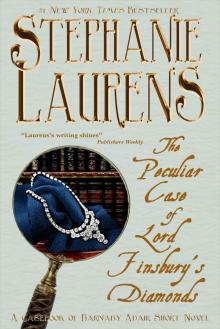 The Peculiar Case of Lord Finsbury's Diamonds: A Casebook of Barnaby Adair Short Novel (The Casebook of Barnaby Adair)
The Peculiar Case of Lord Finsbury's Diamonds: A Casebook of Barnaby Adair Short Novel (The Casebook of Barnaby Adair) Where the Heart Leads
Where the Heart Leads The Designs of Lord Randolph Cavanaugh
The Designs of Lord Randolph Cavanaugh A Secret Love c-5
A Secret Love c-5 On a Wicked Dawn c-10
On a Wicked Dawn c-10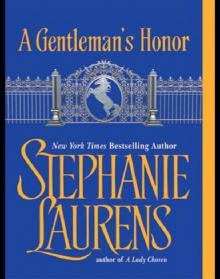 A Gentleman's Honor
A Gentleman's Honor THE LEGEND OF NIMWAY HALL_1750_JACQUELINE
THE LEGEND OF NIMWAY HALL_1750_JACQUELINE A Lady of Expectations
A Lady of Expectations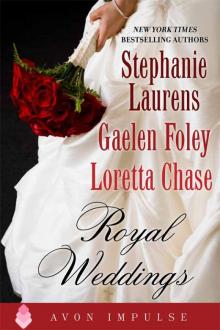 Royal Weddings: An Original Anthology
Royal Weddings: An Original Anthology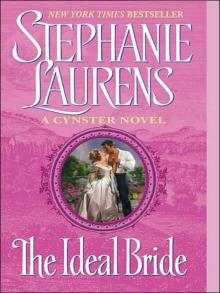 The Ideal Bride (Cynster Novels)
The Ideal Bride (Cynster Novels) Mastered by Love
Mastered by Love A Buccaneer at Heart
A Buccaneer at Heart Captain Jack’s Woman / A Gentleman's Honor
Captain Jack’s Woman / A Gentleman's Honor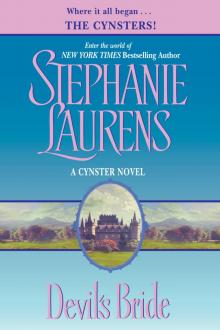 Devil's Bride with Bonus Material
Devil's Bride with Bonus Material A Lady of His Own
A Lady of His Own A Secret Love
A Secret Love Melting Ice
Melting Ice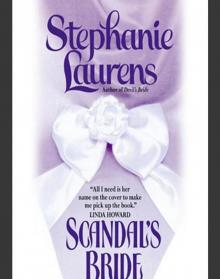 Scandal's Bride
Scandal's Bride Lady Osbaldestone’s Christmas Goose
Lady Osbaldestone’s Christmas Goose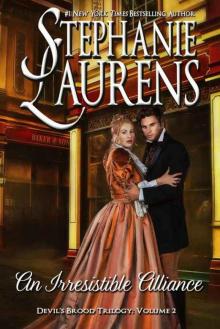 An Irresistible Alliance
An Irresistible Alliance It Happened One Season
It Happened One Season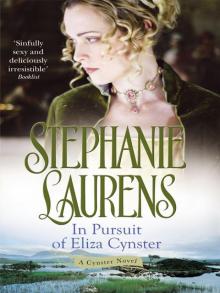 In Pursuit Of Eliza Cynster
In Pursuit Of Eliza Cynster Captain Jack's Woman
Captain Jack's Woman The promise in a kiss c-8
The promise in a kiss c-8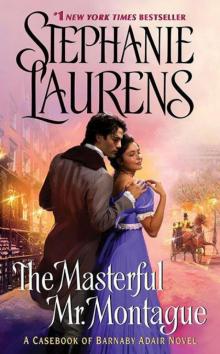 The Masterful Mr. Montague
The Masterful Mr. Montague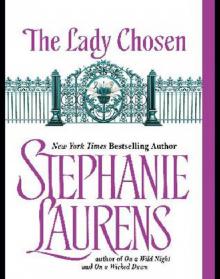 The Lady Chosen
The Lady Chosen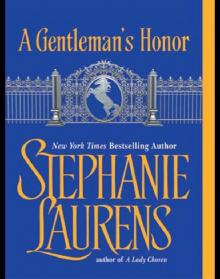 A Gentleman's Honor bc-2
A Gentleman's Honor bc-2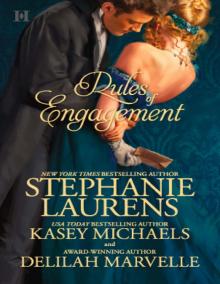 Rules of Engagement: The Reasons for MarriageThe Wedding PartyUnlaced (Lester Family)
Rules of Engagement: The Reasons for MarriageThe Wedding PartyUnlaced (Lester Family) Secrets of a Perfect Night
Secrets of a Perfect Night The Taste of Innocence
The Taste of Innocence On A Wicked Dawn
On A Wicked Dawn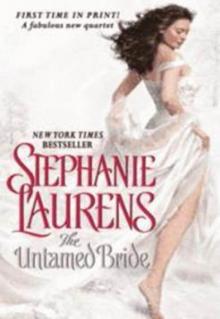 The Untamed Bride
The Untamed Bride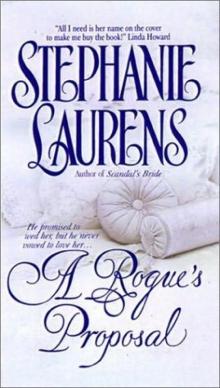 A Rogues Proposal c-4
A Rogues Proposal c-4 Rakes Vow c-2
Rakes Vow c-2 Devils Bride c-1
Devils Bride c-1 Hero, Come Back
Hero, Come Back On a Wild Night c-8
On a Wild Night c-8 All About Passion c-7
All About Passion c-7